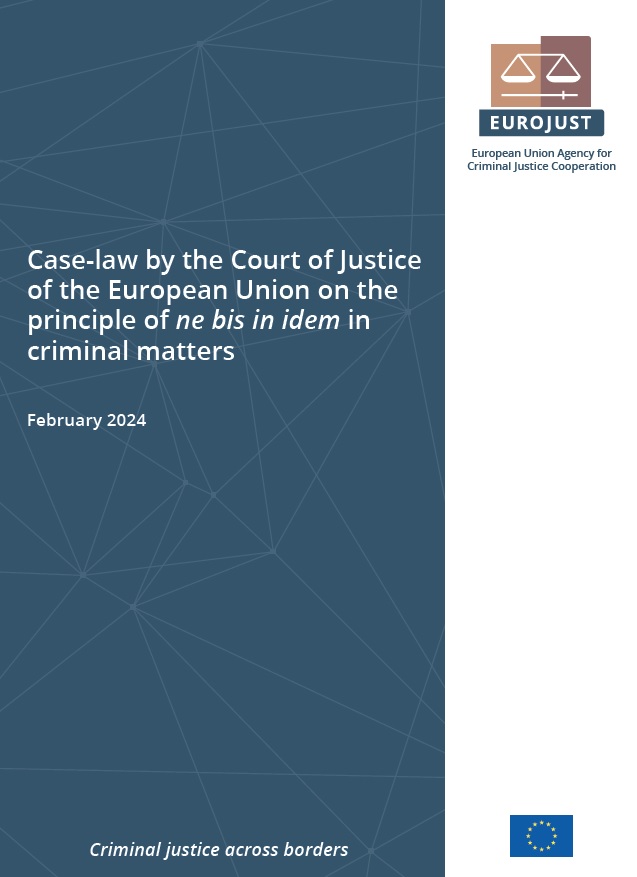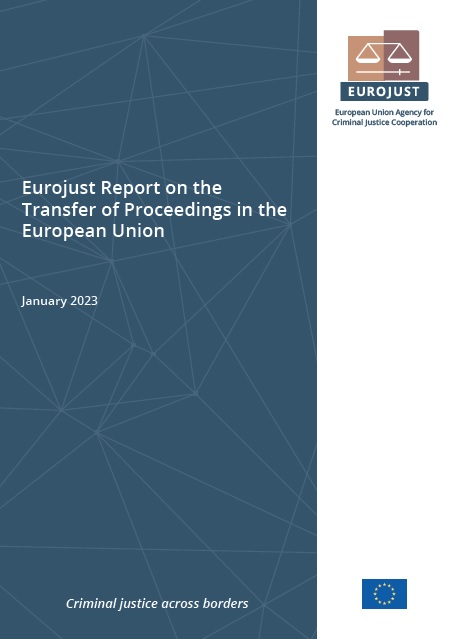Eurojust has considerable experience in preventing and resolving conflicts of jurisdiction and facilitating transfers of criminal proceedings from one State to another. The Agency is uniquely placed to detect linked and parallel proceedings and advise the judicial authorities from the Member States involved on how to reach a shared decision on which State is best placed to prosecute, based on Eurojust’s Guidelines on jurisdiction.
In 2023, the Agency continued to advise national authorities on which State is best placed to prosecute a case, how to overcome issues related to transfers of proceedings and how to prevent ne bis in idem issues.
Preventing infringements of the ne bis in idem principle
During 2023, Eurojust continued to monitor the case-law of the European Court of Justice (CJEU) on the ne bis in idem principle in criminal matters (according to which a person cannot be punished twice for the same acts). The Agency published an updated overview of the CJEU’s case-law in February 2024. The overview provides guidance to judicial practitioners on the application of the ne bis in idem principle in a transnational context. It contains summaries of the CJEU’s judgments categorised according to a set of keywords that reflect the main elements of the ne bis in idem principle. Three judgments issued by the Court of Justice on the ne bis in idem principle in 2023 stemmed from Eurojust cases*.
In September 2023, Eurojust presented its role in resolving conflicts of jurisdiction and preventing infringements of the ne bis in idem principle in an academic conference on ‘European law and the authority of judgments’, organised by the University of Nantes in France.
Eurojust Report on the transfer of proceedings in the European Union
In January 2023, Eurojust published its first Report on the transfer of proceedings in the European Union. The transfer of proceedings upholds justice by helping to resolve issues concerning concurrent jurisdictions in relation to the same offences, while also respecting the fundamental rights of the accused.
Despite its crucial function, there is currently no specific EU instrument regulating the transfer of proceedings. Multiple legal bases apply across the Member States involving different procedures and conditions, which poses various challenges. The report presents the main challenges encountered in Eurojust’s casework, as well as the best practices identified to overcome them. It also outlines the main differences between national legislations concerning procedures and requirements for transferring proceedings to another Member State.
Given its crucial role in assisting national authorities in preventing and resolving conflicts of jurisdiction between Member States, Eurojust has gained extensive experience in facilitating transfers of proceedings across a wide range of case types. Based on this experience, the report also offers recommendations for practitioners and for the EU legislator, including a call for an EU legal instrument in this area.
In June 2023, Eurojust presented the findings of its report at an expert meeting of the European Economic and Social Committee, entrusted with providing an opinion on the proposal for a Regulation on transfer of proceedings (see below).
EU Regulation on transfer of proceedings in criminal matters
In April 2023, the European Commission adopted a proposal for a Regulation on transfer of proceedings in criminal matters, a new judicial cooperation instrument that will be used very often in Eurojust cases in the future. The proposed legislation sets out rules that govern the conditions and procedures under which criminal proceedings initiated in one Member State may be transferred to another Member State. In the future, the authorities of a country will decide whether to request the transfer of proceedings on the basis of a list of common criteria. The Regulation also stipulates obligations with respect to the rights of suspects and accused persons as well as victims when deciding on a transfer.
The proposal incorporates all recommendations put forward by Eurojust in its Report on the transfer of proceedings in the European Union and explicitly provides for an advisory role for the Agency and the EJN. The European Commission’s proposal addresses most of the key issues and best practices highlighted in Eurojust’s report.
Based on its operational expertise on transfer of proceedings, however, Eurojust noted that some aspects of the proposal could raise practical issues. On this basis, the Agency provided comments on the proposal for the consideration of both the Council and the European Parliament. This feedback was duly taken into consideration, and in March 2024, the Council and the European Parliament reached a provisional agreement on the new law, which was formally adopted by the European Parliament on 23 April 2024 and is now awaiting final adoption by the Council.
* Case C-365/21, Generalstaatsanwaltschaft Bamberg (Exception au principe ne bis in idem), Judgment of 23 March 2023; Case C-27/22, Volkswagen Group Italia and Volkswagen Aktiengesellschaft, Judgment of 14 September 2023 and Case C-147/22, Központi Nyomozó Főügyészség, Judgment of 19 October 2023.


